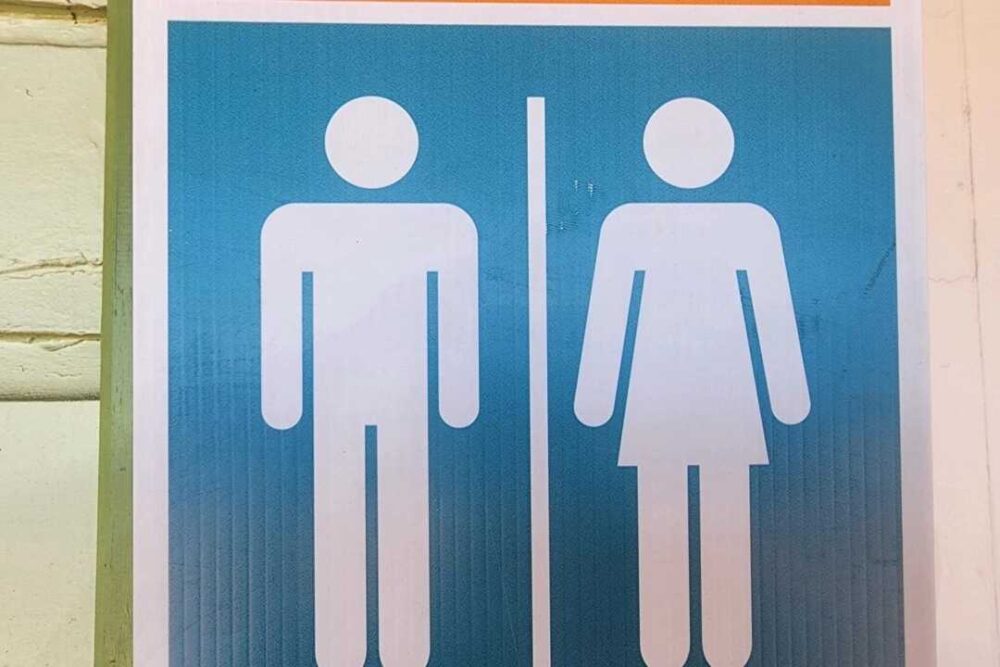
Symbols indicating male and female bathrooms are seen in Perth, Australia, on March 16, 2024. (Susan Mortimer/The Epoch Times)
The Doctors Protecting Children Declaration was issued by pediatricians, doctors, researchers, medical ethics advocates, and faith-based medical groups on June 6 at a news conference in Washington.
Spearheaded by the conservative American College of Pediatricians (ACPeds), the declaration highlights the long-term risks of subjecting gender-confused children to “gender-affirming” interventions, which involves “social transition” such as changing one’s name and appearance to align with a preferred gender, as well as the use of puberty blockers, cross-sex hormones, and genital surgeries.
Instead, psychotherapy for underlying mental health issues such as depression, autism, anxiety, and emotional trauma should be the “first line of treatment” for children who are confused or distressed about their sex, the declaration states.
“We are here defying the claims made by these medical organizations in the U.S. that those of us who are concerned are a minority, and that their protocols are consensus,” Dr. Jill Simmons, a pediatrician and the executive director of ACPeds, said at the event. “They are not consensus, and we are speaking in a loud and unified voice: Enough.”
Dr. Simmons was referring to protocols developed by the World Professional Association for Transgender Health (WPATH), an international nonprofit group dedicated to the study of transgender health.
WPATH’s guidelines, known as Standard of Care 8, recommend that adolescent patients diagnosed with “gender incongruence” be given access to puberty blockers, cross-sex hormones, and surgeries, as long as they can demonstrate “the emotional and cognitive maturity required to provide informed consent/assent for the treatment.”
Dr. Andre Van Mol, a Navy veteran-turned-family physician and adolescent sexuality expert at ACPeds, echoed such concerns.
“Minors cannot give truly informed consent,” he said at the June 4 event, speaking on behalf of the ACPeds, the Christian Medical and Dental Associations, and the American Academy of Medical Ethics. “Children have developing and immature brains, their minds change often, they are prone to risk-taking, they are vulnerable to peer pressure, and they don’t grasp long-term consequences.”
When it comes to the appropriate approaches to treating children who express discomfort with their sex, Dr. Van Mol spoke in favor of the traditional “desistance” method, saying that in most cases, those feelings will resolve on their own over the normal developmental process of puberty.
“The probability of both desistance and underlying mental health and other issues, is why watchful waiting, coupled with mental health evaluation and counseling for both patient and family, was once and is increasingly again recognized as the standard of care for minors with gender dysphoria,” he said.
Stressing the importance of focusing on identifying and addressing the patient’s underlying psychological problems, Dr. Van Mol urges health providers to pursue “mental health alternatives” instead of gender transition.
“Transition affirmation … does not reduce suicides,” he said. “It does not repair mental health issues or trauma.”
“There are good mental health alternatives to gender-affirming health care which address underlying issues, rather than dodging them,” the family physician added. “There is always a more honest way to deal with gender confusion than the chemical sterilization and surgical mutilation of healthy young bodies.”
The June 4 declaration also noted that several European countries have paused transgender medical interventions for children and, citing a need for caution, are instead focusing on addressing the underlying mental health issues.
Sweden, for example, decided in 2022 to restrict hormone therapy for children except in very rare cases, and ruled that mastectomies—the surgical removal of one of both breasts—for teenage girls wanting to transition may be performed only in a research setting. More recently, in April, Scotland’s health authority paused the prescription of puberty blockers to new patients younger than 18.
The declaration urges medical organizations in the United States to follow suit and “immediately stop” promoting the WPATH protocols.
It reads, “We also encourage the physicians who are members of these professional organizations to contact their leadership and urge them to adhere to the evidence-based research now available.”